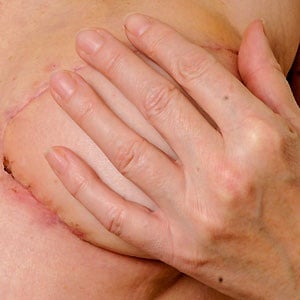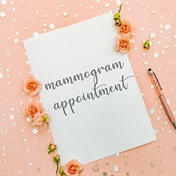
Women diagnosed with an inherited form of breast cancer might halve their risk of dying of the disease if they remove both breasts, a new study suggests.
"I think we've shown pretty clearly that if you have breast cancer and the BRCA mutation, your best option is to get both breasts removed at the outset," said study author Dr. Steven Narod, a senior scientist with the University of Toronto's Women's College Research Institute, in Canada.
Conclusions may be premature
The research, published in the journal BMJ, is the first evidence that shows having a so-called bilateral mastectomy actually saves the lives of women with early stage breast cancer and mutations in their BRCA genes.
But some doctors not involved with the study said the conclusions may be a bit premature.
Read: Surgery does cut genetic breast cancer risk
Angelina Jolie brought new attention to gene testing for breast cancer in May 2013 when she announced she carried a mutation in her BRCA1 gene and was removing both breasts with the hope of avoiding her mother's fate.
Her mother, Marcheline Bertrand, died of cancer at the age of 56. She had been battling breast and ovarian cancer for 10 years.
The genes BRCA1 and BRCA2 produce a protein that thwarts tumours. Certain inherited changes to those genes turn off the protein, dramatically increasing cancer risk.
More aggressive forms of cancer
On average, about 12 percent of women will get breast cancer over the course of their lives. But for women who carry BRCA mutations, the lifetime risk jumps to 60 percent to 70 percent, according to background information included in the study.
They're also more likely to get cancer at younger ages and to be diagnosed with more aggressive forms of the disease.
Such mutations are rare, however. They're estimated to account for about 5 percent to 10 percent of all breast cancers, according to the study.
Read: 10 famous breast cancer survivors
For women who only discover that they carry the defective genes after they've been diagnosed with cancer, it's been unclear whether removal of the opposite breast actually improves their chances of survival.
Mutations in their genes
The new study traced the cancer histories of nearly 400 women with stage 1 and stage 2 breast cancer who were diagnosed between 1977 and 2009.
All the women came from families known to have mutations in their BRCA1 or BRCA2 genes. Most of the women had tested positive for a mutation themselves, and were diagnosed with cancer in their early 40s. They were followed for an average of 13 years.
When it came time for surgery, 209 women opted to remove only the breast affected by the cancer, while 181 had both breasts removed.
Over the course of the study, 79 women died of breast cancer – 61 in the group that had only one breast removed and 18 in the group that had both breasts removed.
Read: Jolie sets a good example by carefully weighing up her risks
After controlling for other factors that might influence survival - such as tumour size, age at diagnosis and whether the cancer had spread to the lymph nodes – researchers found that having both breasts removed reduced a woman's chances of dying of breast cancer by 48 percent during the next 20 years.
The researchers said bilateral mastectomy seemed to do the most good in the second decade after diagnosis.
Cured of breast cancer
"If you have breast cancer and a BRCA mutation – and if you're going to die of that breast cancer – you'll likely die in the first 10 years," Narod said. "After the 10 years are up, in most cases, you should consider yourself cured of breast cancer."
"What that means is that women who died between years 10 and 20 didn't die of the first breast cancer, they died of a new [cancer], and you can prevent that," he said.
Narod said his study underscores the importance of genetic testing, especially for women who are diagnosed at a young age or who have a strong family history of the disease. For them, a positive genetic test should help guide treatment decisions.
Watch: Reader Samantha Nadelman talks about living with breast cancer
For those who aren't ready to part with both breasts, experts say there are other options.
"We get a lot of women who are diagnosed, and they're young and they get sent to us for fast-turnaround BRCA testing so they can make treatment decisions," said Dr. Mary Daly, chairwoman of cancer genetics at Fox Chase Cancer Centre in Philadelphia.
Removing other breast later
"At a time of so much emotion and chaos, I'm not sure they always make the best decision."
"This article sort of shows you that if you're not quite ready to make that decision at the time of the initial diagnosis, you can still go back and remove the other breast later and it probably will still be effective," Daly said.
Only 44 women in the study had both breasts removed at the same time. Another 137 women chose to have their unaffected breast removed at a later date. On average, women removed their second breast about two years after their diagnosis.
Beyond removal of the breasts, Daly said there are other treatments that can help women with BRCA mutations. Those include removal of the ovaries, which also decreases the chances of breast cancer; preventive medications such as tamoxifen; and intensive monitoring with yearly mammograms and MRIs.
Read: What you should know about treating breast cancer with surgery
Should you get tested?
Dr Owen Nosworthy, a Specialist Physician/Medical Oncologist at Wits Donald Gordon Medical Centre says that Angelina’s case is “rare and exceptional” as the gene responsible, BRCA1, is actually very rare and he cautions against women rushing out to get tested.
The genetic test for BRCA1 is not freely available and requires that your doctor refers you to a specialist who will then take your blood to get tested.
The average woman is unlikely to test positive for it, however, and he wouldn't recommend that many women do this unless they have a family history of breast cancer.
Costs of a mastectomy
A prophylactic double mastectomy will set you back around R65,000 and breast reconstruction as much as R85,000. For those on a medical aid scheme, various criteria have to be met, apart from the presence of the BRCA gene before the scheme will considering covering it.
More information:
Angelina: preventative breast removal
How to do a breast self-examination




 Publications
Publications
 Partners
Partners











